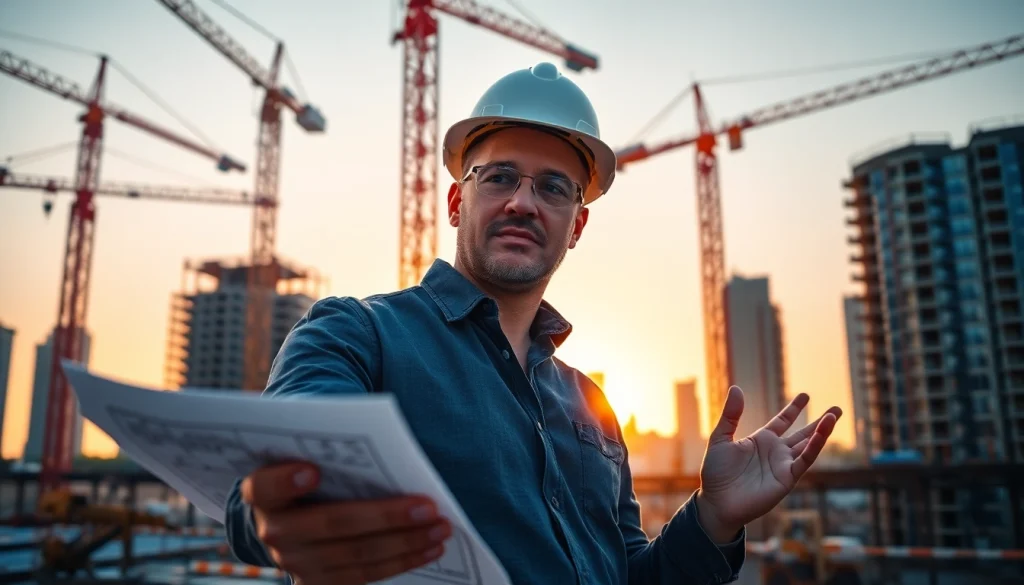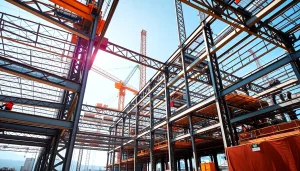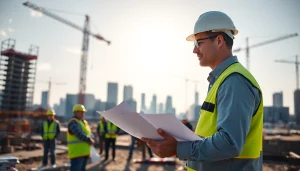Essential Insights for the Manhattan Construction Manager: Best Practices and Strategies

The Role of a Manhattan Construction Manager
The expertise of a Manhattan Construction Manager is pivotal in navigating the complex landscape of building projects in one of the most demanding urban environments. A construction manager’s overarching role encompasses the end-to-end management of construction projects, ensuring that each phase aligns with the project’s objectives, timeline, and budget. Equipped with both technical knowledge and leadership skills, these professionals orchestrate various elements of construction processes, keeping projects on track while meeting the diverse needs of stakeholders.
Key Responsibilities of a Manhattan Construction Manager
Manhattan Construction Managers shoulder a variety of responsibilities integral to project success. These include:
- Project Planning: Developing detailed project plans, including timelines, resource allocations, and project deliverables.
- Budget Management: Estimating project costs accurately and managing expenditures to keep the project within budget.
- Coordination: Liaising with architects, engineers, and subcontractors to ensure smooth collaboration throughout the project lifecycle.
- Quality Control: Implementing quality assurance processes that meet industry standards and client expectations.
- Safety Management: Ensuring compliance with safety regulations and promoting safe practices on construction sites.
- Problem Solving: Addressing challenges as they arise by finding effective solutions to keep projects moving forward.
Essential Skills Required
Successful Manhattan Construction Managers possess a unique blend of skills that allow them to excel in their roles. Some of these skills include:
- Leadership: The ability to lead teams effectively, inspiring them to work collaboratively towards shared goals.
- Communication: Clear communication skills are critical for conveying ideas, plans, and feedback among various project stakeholders.
- Technical Knowledge: A solid understanding of construction processes, materials, and technology, enabling informed decision-making.
- Negotiation: Negotiating contracts and agreements with vendors and service providers to secure favorable terms.
- Time Management: Managing multiple priorities and deadlines without compromising project quality.
Impact on Project Success
The impact of a skilled Manhattan Construction Manager on project success cannot be overstated. Their strategic oversight leads to a significant increase in the likelihood of meeting project deadlines while adhering to budget constraints. In addition, effective communication fosters a collaborative environment, reducing misunderstandings and rework. Ultimately, the expertise of these professionals translates into high-quality project outcomes, enhancing client satisfaction and bolstering the construction firm’s reputation.
Challenges Faced by Manhattan Construction Managers
While the role of a Manhattan Construction Manager is rewarding, it comes with its share of challenges. Understanding these obstacles can aid in developing strategies to overcome them effectively.
Managing Tight Deadlines
In the fast-paced construction environment of Manhattan, timelines are often compressed due to client demands or regulatory constraints. Managing projects under tight deadlines requires meticulous planning and agile management tactics to ensure deliverables are met without compromising quality. Effective use of project management tools and techniques, such as critical path method analysis, can help identify essential tasks and allocate resources efficiently.
Navigating City Regulations
Navigating the complex web of city regulations and zoning laws is a critical challenge for Manhattan Construction Managers. Compliance with local codes, permits, and inspections is non-negotiable and can often lead to delays if not handled meticulously. Staying informed about regulatory changes and maintaining strong relationships with city officials can mitigate these risks. Additionally, hiring consultants or legal experts who specialize in construction law can help ensure compliance and avoid costly setbacks.
Handling Budget Constraints
Budget management is a perennial challenge for construction managers in Manhattan. Rising material costs and unpredictable market fluctuations can strain project budgets. To counteract these pressures, construction managers must implement rigorous financial oversight, conduct regular budget reviews, and utilize forecasting techniques. Building a solid rapport with suppliers can also lead to better pricing and payment terms, helping to keep projects financially viable.
Best Practices for Effective Project Management
To excel as a Manhattan Construction Manager, adopting best practices in project management is essential. Here are key strategies that can enhance project efficiency:
Effective Communication Strategies
Effective communication serves as the backbone of any successful project. Emphasizing transparency and regular updates fosters an environment of trust. Tools such as construction management software, instant messaging platforms, and collaborative apps can facilitate real-time communication among team members. Moreover, holding regular meetings can help align everyone with project goals, timelines, and expectations.
Utilizing Technology in Construction Management
Leveraging modern technology can significantly enhance project management efficiency. BIM (Building Information Modeling) allows managers to create detailed digital representations of projects, enabling better visualization and planning. Project management software can assist in scheduling, budgeting, and resource management, while mobile apps facilitate on-site communication and data collection. Embracing technology not only streamlines operations but also positions construction managers as leaders in innovation.
Building Strong Teams
A construction manager’s success is inherently tied to their team. Building a diverse and skilled team can lead to innovative solutions and improve project outcomes. Encourage collaborative environments by fostering open communication and recognizing individual contributions. Providing ongoing training and development opportunities enables team members to enhance their skills, ultimately benefiting the project and the organization as a whole.
Case Studies of Successful Manhattan Construction Manager Projects
Examining real-world examples of successful projects led by Manhattan Construction Managers can offer invaluable insights into best practices and innovative strategies.
Innovative Approaches in Landmark Projects
Notable projects within Manhattan showcase how innovative techniques can lead to remarkable results. For instance, the construction of a high-rise residential building utilized prefabricated components, which significantly reduced on-site construction time. The integration of green building practices, such as energy-efficient systems and sustainable materials, also played a crucial role in the project’s success while minimizing environmental impact.
Lessons Learned from Previous Projects
Reflecting on past projects can unveil critical lessons that inform future endeavors. A project that faced severe delays due to unforeseen weather conditions highlighted the need for adaptive planning and contingency strategies. Unforeseen logistical challenges led to the development of advanced project simulation scenarios, helping managers prepare for variables that could disrupt workflows.
Achieving Sustainability Goals
As sustainability becomes increasingly essential in construction, Manhattan Construction Managers are at the forefront of integrating eco-friendly practices. A recent project aimed at achieving LEED certification implemented waste reduction strategies and used renewable resources, illustrating the dual commitment to project success and environmental stewardship. Techniques such as biophilic design and energy-efficient construction methods can inspire future projects committed to sustainability.
Future Trends in Construction Management
Looking ahead, several trends are poised to shape the future of construction management in Manhattan:
The Rise of Smart Building Technologies
The integration of smart technologies in building design and construction is set to revolutionize the industry. These innovations include automated systems that enhance energy efficiency and improve occupant comfort. Construction managers will need to adapt to these technological advancements by understanding the implications they have for both the construction process and the final product.
Emphasis on Safety Protocols
As safety remains a top priority within construction, construction managers will play a critical role in establishing enhanced safety protocols. Investments in safety training, equipment, and technology will lead to safer work environments and improved worker morale. The continual implementation of best practices for onsite safety will build a culture where safe operations are prioritized.
Construction Industry’s Adaptation to Economic Changes
As economic factors fluctuate, the construction industry must remain adaptable. Economic downturns may prompt a shift toward more value-engineering processes, while a robust economy can accelerate project timelines and engage new opportunities. Understanding market dynamics will enable construction managers to pivot strategies effectively and remain ahead of the curve.






